- Home
- L. Ron Hubbard
Hell's Legionnaire Page 4
Hell's Legionnaire Read online
Page 4
Harvey was thrust to the front, face to face with Kirzigh.
“Franzawi,” said the caid, smiling a little, “we are glad to make you welcome.”
Harvey looked at the blinded Rubio. “Like you made Grauer?”
There was no hostility to his voice. His tone merely suggested that it was rather hot to stand out here in the sunlight.
“Ah,” replied the caid, “that was his name. I wondered if you had received my message.” He smiled with assurance. He knew that his French was flawless. “Perhaps, when you flew overhead, if you had not taken it upon yourself to slaughter some dozen of my men and horses, I might even now greet you as a guest. However, your action and the attitude of my men will scarcely permit that.”
“No, of course not,” agreed Harvey.
“They are a little hard to hold, Capitaine. Like the men of your Legion at times, hein? The time the Legionnaires attacked that peaceful village south of here and killed the old men and . . . well, soldiers and women . . .”
“I don’t recall,” said Jack Harvey.
“Of course not. You do all your killing from the air, naturally. You do not know what happens here on the ground. You kill and fly away, hein?”
“Yes,” Harvey replied. “Yes, of course.”
“Ah, I see you are a man of understanding, Capitaine. But come, let us get on with this. My men have waited long for one of your sky birds to fall in their midst. Suppose we start with the sergeant, hein?”
“Torture?” said Harvey.
Caid Kirzigh turned and began to bawl orders in a language which Berbers will tell you is Shilha. The men about Rubio snatched heavy holds on his arms and lugged him, feet trailing in the dust, to a mud post in the center of the village.
Rubio was once more swearing—words picked up in the gutters of faraway towns. However, the Berbers did not understand.
Harvey looked on. He could do nothing else. Rifles were hard against his spine. His turn would come next.
Rubio was lashed to the post, arms extended. Unable to see, his imagination was gaining the upper hand over his sanity. He screamed an incoherent gibberish of French, Spanish and Italian. He kicked out with his legs until they fastened them down with leather thongs.
Caid Kirzigh looked at Harvey. “It may be a little brutal, but these men of mine—they have long memories.”
A tall, withered man with a completely expressionless leather-face drew out a rough knife and tested its edge with a thick thumb. Evidently satisfied, he approached the writhing sergeant.
Harvey stiffened and the rifles bored deeper into his spine.
The leathery one reached up and ripped away Rubio’s shirt, exposing the rippling muscles of the white back. With two quick slashes he drew the sign of the cross. The blood came slowly from the wounds. Rubio screamed louder.
Taking a handful of salt, the leathery one rubbed it into the slashes. Then he reached back for a whip, his fingers as thin and fleshless as so many stale bones.
The whip shrilled as it came down. It landed with a report as loud as any pistol shot. Harvey winced as though the lash had struck him. Rubio moaned with agony.
The whip came down again and then rose and fell so many times that Harvey lost count. Not that he was counting. He tried to look away, but each report brought his eyes swinging again to the bleeding pulp which was Rubio’s back. The marks of the knife cross had long since disappeared in the presence of countless red-blue, oozing gashes.
Tired, the leathery one stopped and mopped the sweat from his forehead. He dropped the whip from his numbed hand and rubbed his tired muscles.
Rubio had sagged against the thongs. His head lolled crazily, loosely. His glazed eyes stared up unseeing at the metal blue sky.
A tall, withered man with a completely expressionless leather-face drew out a rough knife and tested its edge with a thick thumb.
The crowd turned sullenly to Jack Harvey. The caid shook his head at them and waved the guards toward the biggest, whitest square house.
The back of Harvey’s shirt was blackened with sweat. He stumbled twice, groggy with heat and reaction.
Caid Kirzigh motioned that the capitaine should seat himself upon a mat in the dim interior. Harvey leaned back against the wall, eyed the caid.
Harvey could see the sagging body of Rubio through the doorless entrance.
“For France,” he said quietly.
Caid Kirzigh had not heard. Rubbing his hands together he smiled. “Capitaine, I believe you left your plane nearby. Is that not so?”
“Yes, that’s true.”
“And hidden somewhere in that plane,” said the caid, “you will have military maps of all Morocco, showing the railheads, the outposts, the concentration centers. Is that not so?”
“Maybe.”
Kirzigh nodded brightly. “Then, perhaps if you were to show me these maps and tell me some other small things, I might . . .” He raised his hands in a vague gesture and leaned forward on his haunches. “I might see fit to let you off with mere shooting.”
“You have large ambitions,” said Harvey.
“Not too large. After all, Capitaine, we had all Europe in our power at one time, you know.”
“Did you?”
“Ah, yes. The Moors, you see . . . Perhaps again . . . One never knows these things until he sees the pages of the Great Book. We built all the structures which Spain considers so beautiful. We introduced an architecture that was new and still lasts. We invented the curved sword with which we captured the world. We invented the system of counting, the mathematics which you conquesting barbarians use to plot your artillery trajectories. Is it so strange that I should like to know about these maps?”
“You want to see the maps, that’s all?”
“That’s all. Just the maps. I should, of course, like to hear some other things, but . . .” He shrugged.
Harvey nodded. “All right. Perhaps you hold the winning cards, Kirzigh. I’ll show you the maps if you’ll . . . well, if you’ll let me off with a mere shooting.”
“Excellent,” smiled the caid. He sprang up and went to the door. “We still have a little time before darkness. We shall go, hein?”
Jack Harvey stood up and allowed himself to be led into the fading sunlight.
It was still hot now, but later in the night it would grow cold—cold enough to make a man want blankets. Porous rock does not hold heat for long.
Accompanied by most of the men in the village, they trooped down the length of a ravine, avoiding boulders, climbing over obstructions. Two rifles were close to Harvey’s shoulder blades, ready to blow him apart.
Caid Kirzigh was happy, joking with his men as he walked. Harvey listened to him, trying to piece together the drift of affairs.
Walking along the floor of another ravine, Harvey said, “Your plan, Kirzigh, would seem to be sound enough.”
“Then you speak Arabic. I did not know.”
“Not well, but enough. Your French, Kirzigh, is excellent.”
“Ah, you like my French, hein? I spent enough time learning it. In Paris, you see. Among those Franzawi that came after the Moors had left.”
“But don’t you think,” said Harvey, “that you’re letting ambition run away from sense?”
“How do you mean?”
“This idea of wiping out the French. They have guns, planes, soldiers by the division. They’d stop you before you could start.”
“Brains and the courage of my men will do it,” said the caid. “Of course this matter will take considerable time. We will wipe them out, outpost by outpost, railhead by railhead. We have, mon capitaine, studied the methods evolved by the Englishman, Lawrence, and find them to be quite enough.”
“But to think of . . .”
“Of a handful of tribesmen, Capitaine, growing into an avalanche of running horses, flaming guns, wiping the Franzawi from the face of the earth. And why not? They loot our villages. They take our women and cast them aside—dead. They destroy our crops. They i
nterfere with our religion. Something must be done. It is not presumptuous to think that I am the man to do it. Careful preparation . . . You know, I am sure.”
They had come into the ravine where the plane had landed. The Caudron spread its silent wings across the sand as though waiting for its master. Its shadow was long in the shaft of faded sun which came down to it.
Distrustful of the ship, the Berbers stopped a hundred paces in front of it, eyeing first the caid, then the wings. They had heard this thing snarl. They had seen death pour out from it. And nothing Caid Kirzigh could do would make the bulk of them continue on.
Kirzigh looked into the faces of his men and then shrugged.
“It is all right,” he said. “You are within easy shot of a hundred good rifles. The three of us shall continue.”
The three included one guard. The others hung back.
The tail of the plane was pointing toward them. Kirzigh, sword unsheathed, approached with sidelong glances at Harvey.
“Remember,” said the caid, “that should you try to get into that ship and away they will riddle you with bullets. And if you are unlucky enough to be alive after such a move . . .”
Harvey strode on, the rifle probing into his spine. His face was quiet, composed. They reached the side of the fuselage and Harvey pointed into the rear pit. “The charts are there.”
“I shall remove them,” replied the caid. He rummaged through the interior, a little dazed by the presence of so many strange things. Presently, he backed away and pointed up. “You get them out.”
Harvey grunted and climbed up over the rim. He dropped to the seat and fumbled under the panel.
Suddenly he straightened. Grabbing the butts of the twin guns he swiveled them around and down with one fast jerk. The Berber rifle exploded almost against his waist. The slug whirled him, numbed him. He clawed at the butts, keeping his feet only through the force of will.
The machine guns racketed. The guard fell, hands extended. Kirzigh caught the burst in the chest and lower jaw.
Rifles hammered and the tribesmen began to surge forward. Harvey brought the guns about and pressed the trips. They leaped, quivering in his hands. Right to left, left to right. Six, seven hundred slugs a minute from each gun. The breech gnawed through the belt, spitting out empty, tinkling brass cases.
The Berbers stopped for an instant and then came on again. A bullet smashed its way through the flesh of Harvey’s arm. The guns grew melting hot. The rush stopped once more. The men glanced fearfully about and found they stood in isolated groups. The red-tinged sand, fired by the dying sun, was clotted with unmoving bundles of white, strewn about like empty sacks.
With a concerted scream of terror, the tribesmen sprinted for the shelter of the canyon end. Harvey gave them three short bursts.
He did not know that he was badly hit. He was only thinking about the engine. Racing around to the front, he yanked through on the prop. Diving through the interwing section, he threw on both magnetos. Back at the prop again he found strength enough to pull it through. At any instant they might return.
The Moraine-Ditrich was faithful. It roared into chattering life, sucking flame into its water-cooled cylinders.
Stumbling, Harvey placed his hands on the cockpit rim. Looking down he saw Caid Kirzigh’s head, blood-spattered and mangled against his dusty boots.
A tired frown flicked across the capitaine’s graying face. Looking down the ravine, he saw that the men had not had time to form another attack. He gripped the bright sword and, with a grunt of distaste, lopped off Kirzigh’s head!
When the gory thing rolled free from the body, Harvey swallowed hard, a little sick. But it had been necessary. It was not until then that he noticed the guard striving to get at his fallen rifle.
Unmindful of his own weakness, Harvey threw both guard and head into the rear cockpit. The Berber slumped down, eyes glazed with terror.
The Caudron wallowed through the sand, picking up speed. Seeing it go, the Berbers turned and ran after it, shouting and waving their guns, pausing to fire. They stopped when they came to the headless body of their caid.
The motorcycle lurched to a stop before the door of the office on the great square of Fez. Two were riding in the side car and a Legionnaire was astride the saddle.
Capitaine Jack Harvey, shaky from exhaustion, lifted the dead weight of the Berber from him and stood up. He approached the square light which fell from Duprey’s entrance, yellow on black stone.
Major Duprey whirled at the sound of boots, stopping midway in his restless stride down the concrete floor. Harvey was without tunic and his sleeve was rolled up to his shoulder, displaying bandages. He carried a red-smeared burnoose in his hand.
“You’re late,” said Duprey, glowering.
Harvey placed the bundle on Duprey’s desk. “I was detained,” he said slowly, “and Rubio is dead.”
“Rubio? And who the devil is Rubio? What’s this thing you’ve got here, man?”
“A souvenir,” replied Harvey. His eyes were watchful, studying Duprey’s face.
Duprey muttered something and then saw the Berber who was being held outside. “Who’s that?”
“A man I captured. I believe it would be better, Major, to turn him in to the hospital. He’s wounded.”
“Wounded, you say? What do I care about a wounded Berber? He’ll know all about the plans these barbarians have been concocting to launch against France. Gian!”
Gian, sleek as a staff officer should be, came out from an adjoining room, the picture of a perfect soldier.
“Gian,” said Duprey. “Take that Berber out there and put him through the . . .”
“You mean . . . ?” said Gian.
“Information, understand? And it’s no matter to us if you kill him. But get the information. Get it, do you hear?”
Gian saluted and went out. The Berber was led away. Duprey turned back to his desk and the bundle.
“Now,” he said, “now let’s see what you’ve got here.”
He unfolded the smeared burnoose and disclosed the bullet-mangled head of Caid Kirzigh. For a moment he was startled.
“It’s Kirzigh’s,” supplied Harvey, still watchful.
“Kirzigh’s. Ho! That’s a joke. He sends me a head and then I have his. Well, that’s fair enough, isn’t it? Ugly-looking brute, wasn’t he? These damn uncivilized devils think they’re above losing their lives. Well, I showed them, didn’t I?”
Harvey swallowed. His alert eyes grew a little haggard.
Duprey replaced the wrappings. “Kirzigh’s head! Ah, that’s the best joke yet. Here, I must take this over to the colonel. He’ll be pleased, Capitaine, very pleased.”
Duprey went briskly to the door, the grisly burden swinging carelessly at his side. He remembered something and turned. “Oh, yes, Harvey. I see you’re wounded. Get it fixed up and turn yourself in to the hospital. You’ll . . . well, you’ll get a mention in the orders of the day for this. By the saints,” he laughed, “you might even get a medal.”
“For France,” said Harvey, dully.
“For France!” cried the major. Night swallowed his footsteps.
Harvey went to the desk and picked up a bottle of cognac, pouring himself a stiff shot. He raised the glass to the height of his eyes and said, “For France,” very quietly. Then he drank and limped out to the great square.
For half an hour he stood there, watching the natives pass back and forth. Watching their straight shoulders and observant blue eyes, their silks and fine leathers. For the first time, he was seeing them.
He sighed finally and turned to go toward the hospital. He felt disappointed, let down. Hollow inside, somehow, as though he had lost something which rightfully belonged to him.
But then, of course, you couldn’t expect Major Duprey to get the point.
They were laughing in the colonel’s quarters.
The Squad That Never Came Back
CHAPTER ONE
The Dying Man
BAC
K in Sidi-bel-Abbès they still think that my squad and I died in a miserable outpost on the northern slope of the High Atlas Mountains. Well, they’re seven-eighths right. I’m still living, but the rest of the squad have long since given their bones to dust in the rocky heights of Morocco. I could not go back until it was too late—and now I don’t want to.
Besides, the papers tell me that they are thinking the Legion will be held only as a police force and labor outfit from now on. That lets me out.
The papers tell me other things. And one of these things has prompted me to write my story. The news concerns a discovery made in Morocco a short while back.
Two airmen, according to a press dispatch, were flying south of Casablanca over uncharted terrain. They brought back the tidings that they had discovered a city in a lake. Their guess was that it was an ancient Roman city, untouched for centuries.
Also, they are thinking of fitting out an expedition to visit that place overland. Judging from the reports of the two airmen, it would seem that the four corner towers and the wall are clearly visible in this lake.
That expedition is due for a surprise. They’ll drain that lake to discover that only a small quantity of silt has been deposited on the paved streets. They’ll also find fabrics still intact. And, I have no doubt, they’ll find the skeletons of men not long dead. Doubtless, this will amaze them.
They will write innumerable theses to explain that this water has a certain mysterious chemical component which makes it impossible for bones to decay. However, mes amis, the true explanation is very simple—entirely too simple to be grasped by the scientific mind.
They’ll find that those men have been dead not longer than two years. And yet they are buried in a Roman city which flourished before Caesar. And the terrain on which this city is built is a blank spot on the map. It is on the northern slope of the High Atlas.
No topographer has ever carried his alidade that deep into northern Africa, and there are only a few of us who have known the Legion who can sketch the trails that are safe, the few water holes that exist in that bleached aridity.

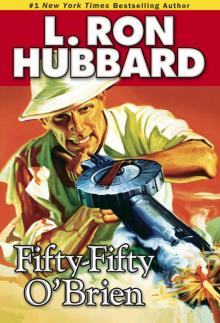 Fifty-Fifty O'Brien
Fifty-Fifty O'Brien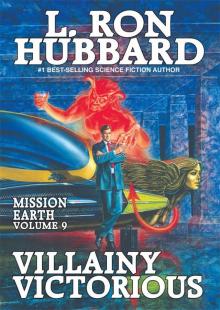 Villainy Victorious
Villainy Victorious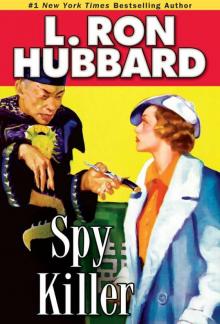 Spy Killer
Spy Killer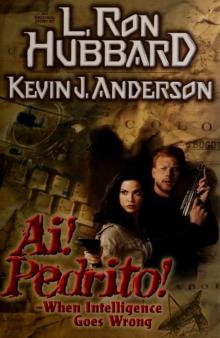 Ai! Pedrito!: When Intelligence Goes Wrong
Ai! Pedrito!: When Intelligence Goes Wrong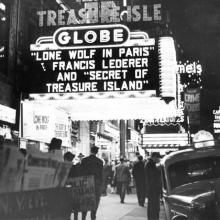 The Dangerous Dimension
The Dangerous Dimension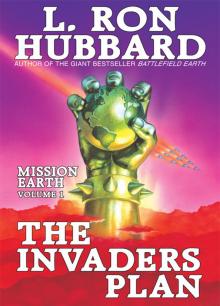 Mission Earth Volume 1: The Invaders Plan
Mission Earth Volume 1: The Invaders Plan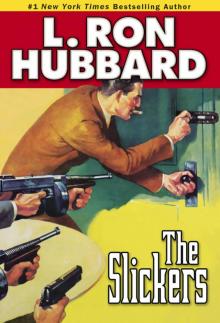 The Slickers
The Slickers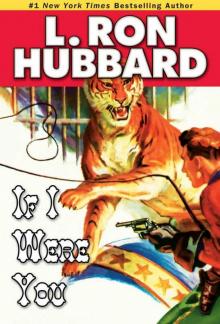 If I Were You
If I Were You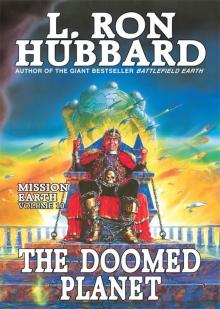 The Doomed Planet
The Doomed Planet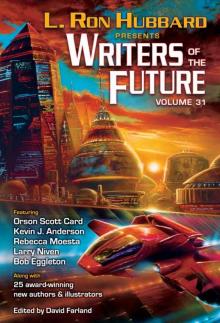 Writers of the Future Volume 31
Writers of the Future Volume 31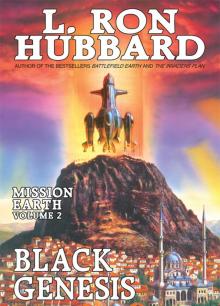 Mission Earth Volume 2: Black Genesis
Mission Earth Volume 2: Black Genesis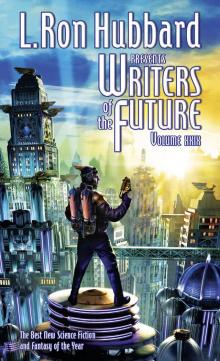 Writers of the Future: 29
Writers of the Future: 29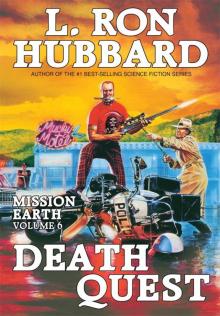 Death Quest
Death Quest The Enemy Within
The Enemy Within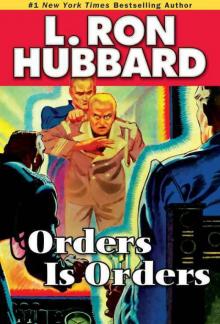 Orders Is Orders
Orders Is Orders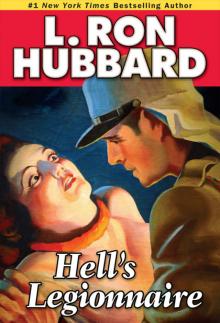 Hell's Legionnaire
Hell's Legionnaire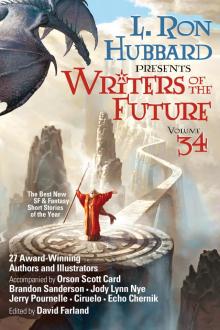 L. Ron Hubbard Presents Writers of the Future 34
L. Ron Hubbard Presents Writers of the Future 34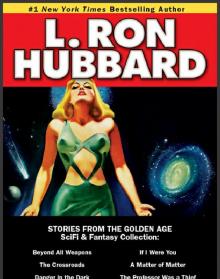 The Scifi & Fantasy Collection
The Scifi & Fantasy Collection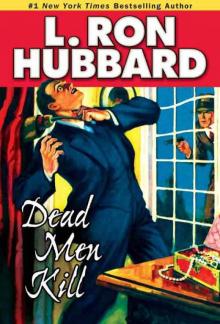 Dead Men Kill
Dead Men Kill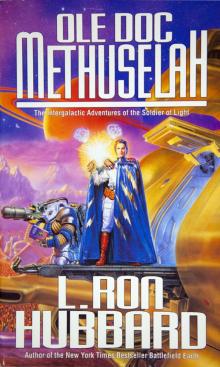 Ole Doc Methuselah: The Intergalactic Adventures of the Soldier of Light
Ole Doc Methuselah: The Intergalactic Adventures of the Soldier of Light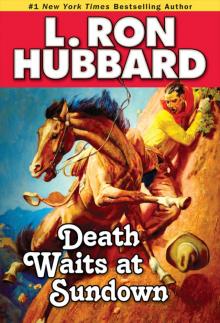 Shadows From Boot Hill
Shadows From Boot Hill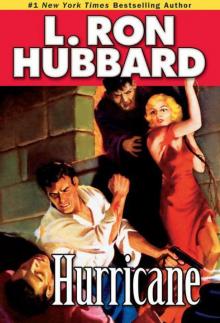 Hurricane
Hurricane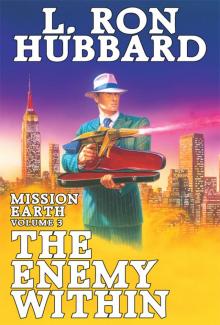 Mission Earth Volume 3: The Enemy Within
Mission Earth Volume 3: The Enemy Within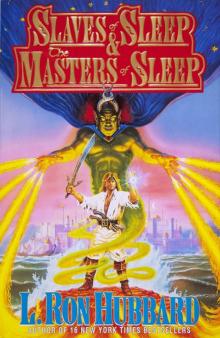 Slaves of Sleep & the Masters of Sleep
Slaves of Sleep & the Masters of Sleep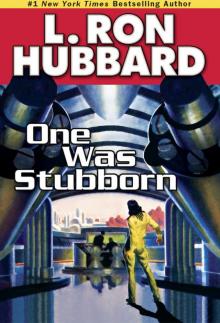 One Was Stubborn
One Was Stubborn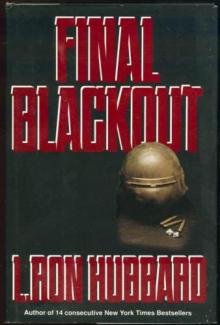 Final Blackout: A Futuristic War Novel
Final Blackout: A Futuristic War Novel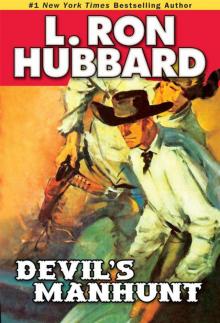 Devil's Manhunt
Devil's Manhunt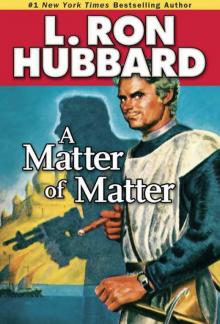 A Matter of Matter
A Matter of Matter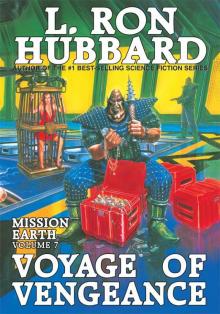 Voyage of Vengeance
Voyage of Vengeance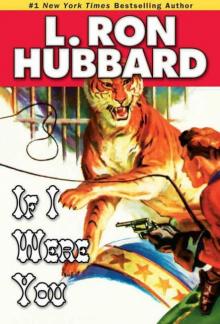 If I Were You (Science Fiction & Fantasy Short Stories Collection)
If I Were You (Science Fiction & Fantasy Short Stories Collection)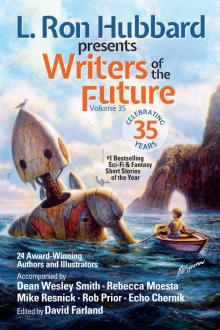 L. Ron Hubbard Presents Writers of the Future Volume 35
L. Ron Hubbard Presents Writers of the Future Volume 35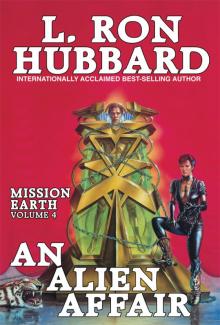 Mission Earth Volume 4: An Alien Affair
Mission Earth Volume 4: An Alien Affair Black Genesis
Black Genesis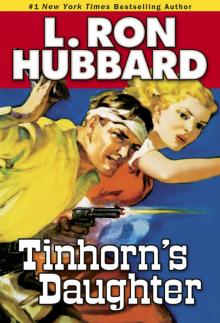 Tinhorn's Daughter
Tinhorn's Daughter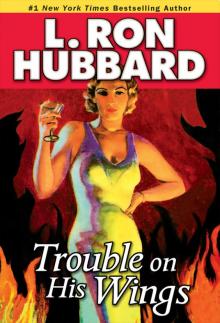 Trouble on His Wings
Trouble on His Wings Writers of the Future Volume 27: The Best New Science Fiction and Fantasy of the Year
Writers of the Future Volume 27: The Best New Science Fiction and Fantasy of the Year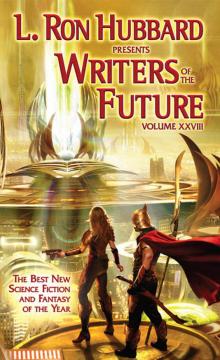 Writers of the Future Volume 28: The Best New Science Fiction and Fantasy of the Year
Writers of the Future Volume 28: The Best New Science Fiction and Fantasy of the Year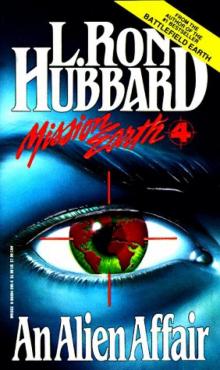 An Alien Affair
An Alien Affair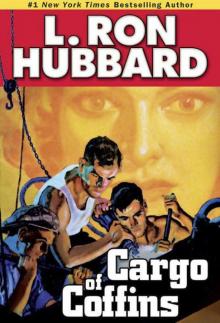 Cargo of Coffins
Cargo of Coffins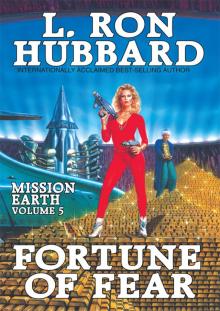 Mission Earth Volume 5: Fortune of Fear
Mission Earth Volume 5: Fortune of Fear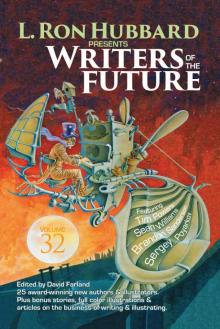 Writers of the Future 32 Science Fiction & Fantasy Anthology
Writers of the Future 32 Science Fiction & Fantasy Anthology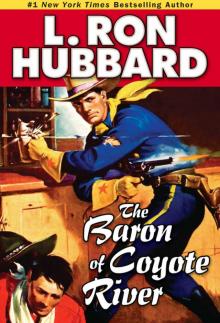 The Baron of Coyote River
The Baron of Coyote River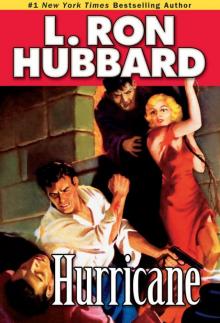 Hurricane (Stories From the Golden Age)
Hurricane (Stories From the Golden Age)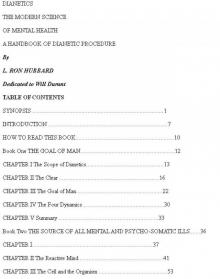 Dianetics: The Modern Science of Mental Health
Dianetics: The Modern Science of Mental Health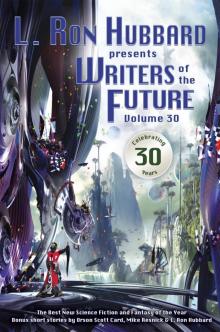 Writers of the Future, Volume 30
Writers of the Future, Volume 30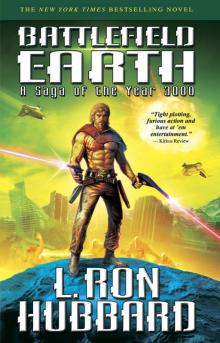 Battlefield Earth: A Saga of the Year 3000
Battlefield Earth: A Saga of the Year 3000 Fear
Fear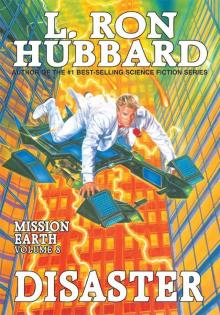 Disaster
Disaster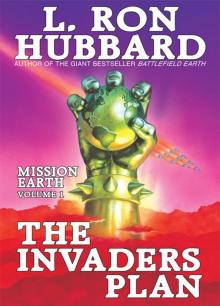 Invaders Plan, The: Mission Earth Volume 1
Invaders Plan, The: Mission Earth Volume 1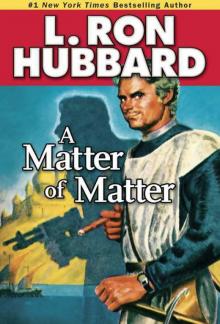 A Matter of Matter (Stories from the Golden Age)
A Matter of Matter (Stories from the Golden Age)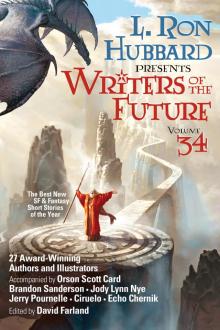 Writers of the Future Volume 34
Writers of the Future Volume 34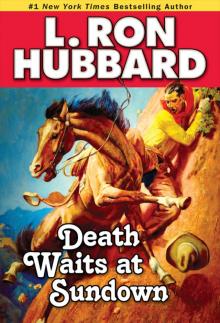 Death Waits at Sundown
Death Waits at Sundown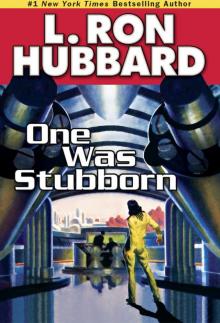 One Was Stubbron
One Was Stubbron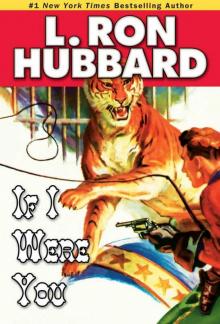 If I Were You (Stories from the Golden Age)
If I Were You (Stories from the Golden Age)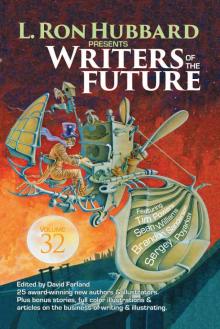 Writers of the Future 32 Science Fiction & Fantasy Anthology (L. Ron Hubbard Presents Writers of the Future)
Writers of the Future 32 Science Fiction & Fantasy Anthology (L. Ron Hubbard Presents Writers of the Future)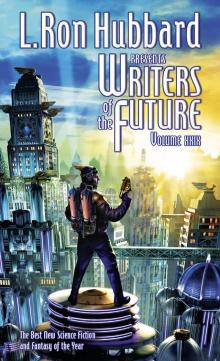 Writers of the Future, Volume 29
Writers of the Future, Volume 29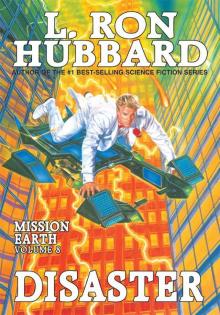 Mission Earth Volume 8: Disaster
Mission Earth Volume 8: Disaster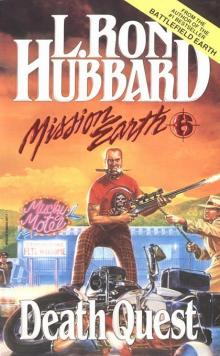 Mission Earth 6: Death Quest
Mission Earth 6: Death Quest Writers of the Future, Volume 27
Writers of the Future, Volume 27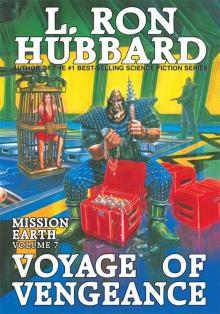 Mission Earth Volume 7: Voyage of Vengeance
Mission Earth Volume 7: Voyage of Vengeance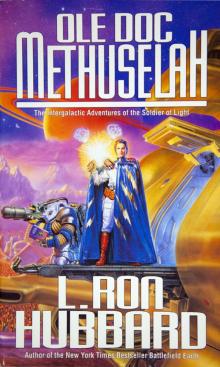 Ole Doc Methuselah
Ole Doc Methuselah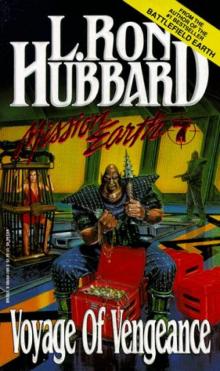 Mission Earth 07: Voyage of Vengeance
Mission Earth 07: Voyage of Vengeance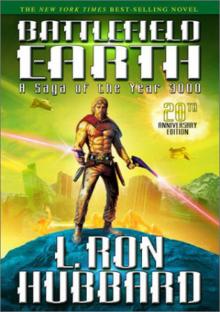 Battlefield Earth
Battlefield Earth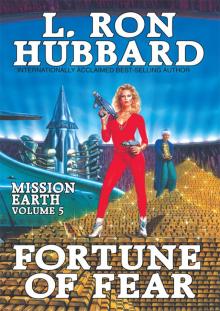 Fortune of Fear
Fortune of Fear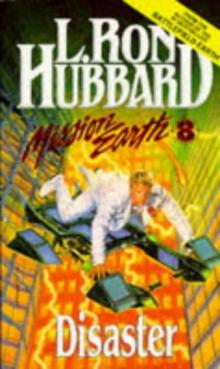 Mission Earth 8: Disaster
Mission Earth 8: Disaster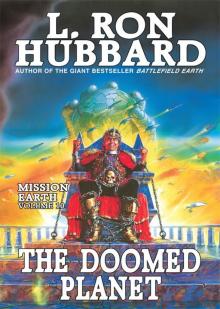 Mission Earth Volume 10: The Doomed Planet
Mission Earth Volume 10: The Doomed Planet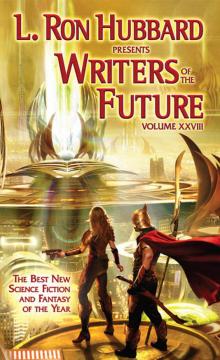 Writers of the Future, Volume 28
Writers of the Future, Volume 28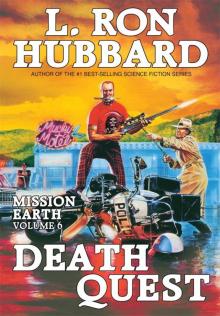 Mission Earth Volume 6: Death Quest
Mission Earth Volume 6: Death Quest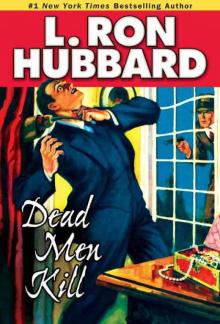 Dead Men Kill (Stories from the Golden Age)
Dead Men Kill (Stories from the Golden Age)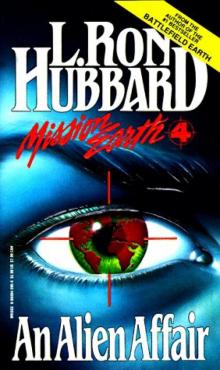 Mission Earth 4: An Alien Affair
Mission Earth 4: An Alien Affair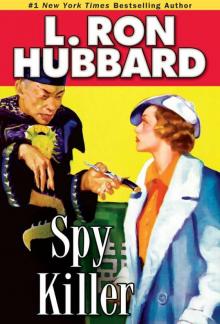 Spy Killer (Stories from the Golden Age)
Spy Killer (Stories from the Golden Age)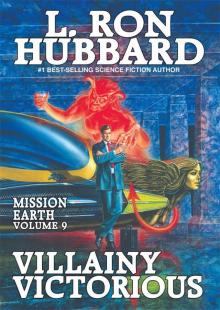 Mission Earth Volume 9: Villainy Victorious
Mission Earth Volume 9: Villainy Victorious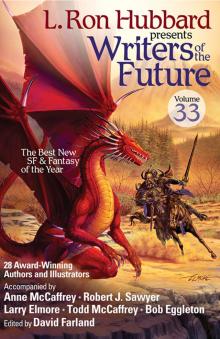 L. Ron Hubbard Presents Writers of the Future, Volume 33
L. Ron Hubbard Presents Writers of the Future, Volume 33